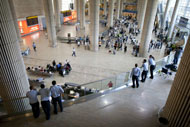
It has been just under a week since the historic deal between Hamas and Israel saw the release of captured Israeli soldier Gilad Shalit for 1,027 Palestinian political prisoners.
It has been an emotional week on both sides of the divide. In Palestine, huge celebrations welcomed the prisoners home, most of whom had served decades behind bars and would have spent the rest of their lives there if it were not for the swap. Men and women were reunited with mothers, wives, husbands and children amid tears and ululations, and all Palestinians – regardless of political affiliations – rejoiced in their homecoming.
In Israel, an entire nation let out a sigh of relief that their son had come home safely. The face of Gilad Shalit was splashed across television screens, newspapers and internet sites for days, his family and loyal supporters crying and hugging the soldier who had been in the grips of Hamas for over five years.
There is no arguing the intense human aspect behind this prisoner release. But what so much of the western press in particular has bypassed so far is the human aspect of our prisoners, who unlike Shalit, have been bunched up into one unappealing category: murderers, terrorists, people out for blood. And who wants to give a human story to that?
It is very upsetting to see how things have transpired since the swap took place. While it would seem hypocritical to brush aside the ordeal Shalit endured over the past five years it is also unfair that these brave men and women who have endured some of the roughest conditions in Israel’s prisoners are not given the same if not more attention. Israeli Prime Minister Benjamin Netanyahu set the tone early on for how the released Palestinian prisoners should be viewed by the world: they were terrorists, they were murderers and they would pay an even heavier price than before should they return to their old ways. "Our people differ in that we are not celebrating the release of terrorists. Israelis are celebrating the freedom of their fellow countryman and not murderers," he said in a speech at the Tel Nof air force space where Shalit was brought after his return.
What may come as a surprise to many but should actually be a well known fact is that, despite the warm and fuzzy image of Gilad Shalit’s homecoming, this young man was a soldier in the Israeli army, sitting in a tank facing Gaza. That can only mean one thing. Shalit was not sunbathing when Palestinian operatives carried out a surprise attack on his unit. He was prepared to shoot and kill Palestinians, just like all the other army units around Gaza.
So, Gilad Shalit knew what he was doing and probably knew that when he fired his tank shell, he would probably hit innocent civilians, perhaps children. Perhaps, in the course of his short career in the army he already had, who knows. But in any case, that was what he was trained for and what he would do in a blink of an eye if commanded by his superiors.
So, before the press is quick to condemn the freed prisoners, perhaps they should balance their criticism for both sides. Just as Gilad Shalit was barred from family, from sunlight and from interaction with others, countless Palestinian prisoners have endured months and years in solidarity confinement, others have not been allowed family visits and still others have been subjected to severe torture methods by Israeli intelligence officers during interrogation sessions that have lasted weeks and months on end.
Whether we agree with methods of resistance or not, or even the methods of the Israeli army, we cannot deny the humanity of a people. The picture of a Palestinian mother embracing her children after years of separation, of Aweida Quwlab who spent years in a solitary cell and who now cannot stand a closed door or window and who does not even recognize his own son, are scenes of human suffering, which must be acknowledged.
In an article that appeared in the Boston Globe, freed prisoner Eyad Abu Hisaran, who was exiled to Gaza after spending 20 years behind bars, poignantly described what separates Palestinians from so many other peoples, including Israelis.
"In general I like freedom. I want to work and get married” he admitted. “But I don't just want to work, I want to live," he said. "I like to be free.”
Joharah Baker is Director of the Media and Information Department at the Palestinian Initiative for the Promotion of Global Dialogue and Democracy (MIFTAH). She can be contacted at [email protected].









